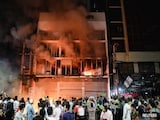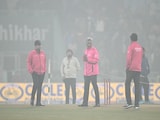A cleaner removes a blue barrel from the apartment in Dallas where Thomas Eric Duncan, the Ebola patient who traveled from Liberia to Dallas. (Associated Press)
Washington:
The Texas hospital that treated a Liberian man who died of Ebola defended its actions on Thursday, saying the medical staff did all they could to save him.
The statement was issued a day after Thomas Eric Duncan died of Ebola and followed accusations of unfair treatment by members of Duncan's family.
Duncan was the first person diagnosed of Ebola in the United States and the first to die in a US hospital of the hemorrhagic fever that has killed 3,900 in West Africa this year.
On Wednesday, Duncan's nephew Joe Weeks told ABC News he felt Duncan had received "unfair" medical treatment.
Unlike three of the American patients who were infected with Ebola and transported back to the United States for treatment, Duncan was not given a blood transfusion from a survivor of Ebola.
The effectiveness of this treatment is unknown, but the World Health Organization supports it because it is believed to convey potent antibodies from a survivor to a patient.
"Mr. Duncan did not receive the same type of serum transfusion as the patient in Nebraska (NBC freelance cameraman Ashoka Mukpo) because his blood type was not compatible with the serum donors," said Texas Health Presbyterian Hospital Dallas.
Duncan was given an experimental drug brincidofovir on Saturday, almost a week after he was first hospitalized.
"The investigative drug was administered as soon as his physicians determined that his condition warranted it, and as soon as it could be obtained," the statement said.
Another experimental drug, ZMapp, which was given to US missionaries Kent Brantly and Nancy Writebol -- who survived their Ebola infections -- is no longer available, the hospital noted.
The Texas hospital has also come under fire for initially sending Duncan home when he first sought treatment on September 25.
Duncan was discharged though he told the staff of his symptoms and recent travel in Liberia, the hardest hit nation in the West African outbreak. He returned to the hospital via ambulance on September 28.
"Our care team provided Mr. Duncan with the same high level of attention and care that would be given any patient, regardless of nationality or ability to pay for care," said the statement.
"In this case that included a four-hour evaluation and numerous tests."
Duncan's health deteriorated in the days after he was admitted, and he died on October 8.
"In spite of the intensive care he was receiving, his heart stopped," said the hospital statement.
"Early in his hospital stay, Mr. Duncan had expressed his wishes to his attending physician that the care team should not perform chest compressions, defibrillation or cardioversion to prolong his life," it added.
T
he hospital insisted that doctors "treated him with the most appropriate and available medical interventions," and said everyone at the hospital was grieving the loss.
The statement was issued a day after Thomas Eric Duncan died of Ebola and followed accusations of unfair treatment by members of Duncan's family.
Duncan was the first person diagnosed of Ebola in the United States and the first to die in a US hospital of the hemorrhagic fever that has killed 3,900 in West Africa this year.
On Wednesday, Duncan's nephew Joe Weeks told ABC News he felt Duncan had received "unfair" medical treatment.
Unlike three of the American patients who were infected with Ebola and transported back to the United States for treatment, Duncan was not given a blood transfusion from a survivor of Ebola.
The effectiveness of this treatment is unknown, but the World Health Organization supports it because it is believed to convey potent antibodies from a survivor to a patient.
"Mr. Duncan did not receive the same type of serum transfusion as the patient in Nebraska (NBC freelance cameraman Ashoka Mukpo) because his blood type was not compatible with the serum donors," said Texas Health Presbyterian Hospital Dallas.
Duncan was given an experimental drug brincidofovir on Saturday, almost a week after he was first hospitalized.
"The investigative drug was administered as soon as his physicians determined that his condition warranted it, and as soon as it could be obtained," the statement said.
Another experimental drug, ZMapp, which was given to US missionaries Kent Brantly and Nancy Writebol -- who survived their Ebola infections -- is no longer available, the hospital noted.
The Texas hospital has also come under fire for initially sending Duncan home when he first sought treatment on September 25.
Duncan was discharged though he told the staff of his symptoms and recent travel in Liberia, the hardest hit nation in the West African outbreak. He returned to the hospital via ambulance on September 28.
"Our care team provided Mr. Duncan with the same high level of attention and care that would be given any patient, regardless of nationality or ability to pay for care," said the statement.
"In this case that included a four-hour evaluation and numerous tests."
Duncan's health deteriorated in the days after he was admitted, and he died on October 8.
"In spite of the intensive care he was receiving, his heart stopped," said the hospital statement.
"Early in his hospital stay, Mr. Duncan had expressed his wishes to his attending physician that the care team should not perform chest compressions, defibrillation or cardioversion to prolong his life," it added.
T
he hospital insisted that doctors "treated him with the most appropriate and available medical interventions," and said everyone at the hospital was grieving the loss.















